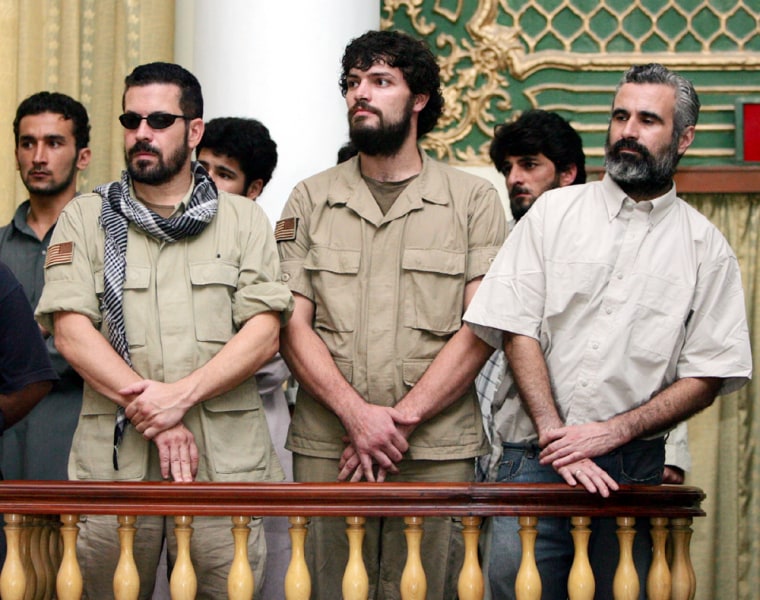Three Americans have been sentenced to up to 10 years in jail after being found guilty by an Afghan court on charges including torture, running a private prison and illegal detention.
Jonathan “Jack” Idema, a former U.S. Green Beret, was arrested in July along with another ex-serviceman, Brent Bennett, and documentary film-maker Edward Caraballo.
They had denied the charges and insisted they were in Afghanistan with U.S. and Afghan government sanction to help track down al-Qaida and Taliban extremists.
“I apologize that we tried to save these people,” Idema told reporters immediately after the verdict. “We should have let the Taliban murder every ... one of them,” he said bitterly.
Idema and Bennett were each sentenced to 10 years in jail and Caraballo to eight. Four Afghan co-defendants received sentences ranging from one to five years.
John Edwards Tiffany, a lawyer for Idema, said they planned to appeal.
“Justice was not served today,” Tiffany said. “I blame the U.S. government, the Bush administration and the Afghan legal system, which is not anywhere near where it needs to be.”
Idema told the court earlier that he had been issued with a passport by a special U.S. agency that he declined to name and had a visa for Afghanistan similar to those given to special forces operatives.
Speaking under an oath he swore on the Quran — to applause from the gallery — Idema insisted he had been operating with official U.S. and Afghan sanction.
“I swear in the name of Allah to tell the truth and nothing but the truth,” he said.
He did not give details on why he thought the FBI had set him up, or what their motive might be.
Other media have reported that Idema saw himself as a bounty hunter, and was after the fortune U.S. authorities have placed on Osama bin Laden’s head.
Idema says he was set up
Shortly before the verdict was read, Idema told reporters that he had been set up, saying the U.S. government had abandoned them as soon as accusations of torture were made.
“No one tortured anyone,” he added.
The Idema case came to light in the wake of scandals over U.S. treatment of detainees in Iraq and Afghanistan.
Afghan authorities said Idema had entered the country illegally, was running a private prison, had tortured and illegally detained Afghans and had harmed relations between Afghanistan and the U.S.
Earlier, the judge rejected an appeal by the defendants’ lawyers to dismiss the case on the grounds the court was not up to international standards.
They said the judicial process they had experienced so far scarcely met Afghan standards, let alone international ones.
“This is so far removed from what I am used to,” Tiffany told reporters during a recess.
Idema has insisted since his arrest that he was operating for the U.S. government on anti-terror activities, claiming to have been in contact with officials working for U.S. Defense Secretary Donald Rumsfeld.
He said he was gathering intelligence in the hunt for bin Laden and other al Qaeda officials, blamed for the Sept. 11, 2001 attacks on the United States and believed to be hiding somewhere along the Afghan-Pakistan border.
The Pentagon has denied that.
On Wednesday, Idema arrived at the court wearing a khaki military-style shirt with a U.S. flag on the right shoulder, dark sunglasses and a black-and-white Arabic style scarf favored by U.S. special forces in the region.
His lawyers showed the court a video of the three arriving in Kabul and being spoken to at the airport by senior Afghan officials including Kabul police chief Baba Jan — proof, they said, that their mission was a legal one.
